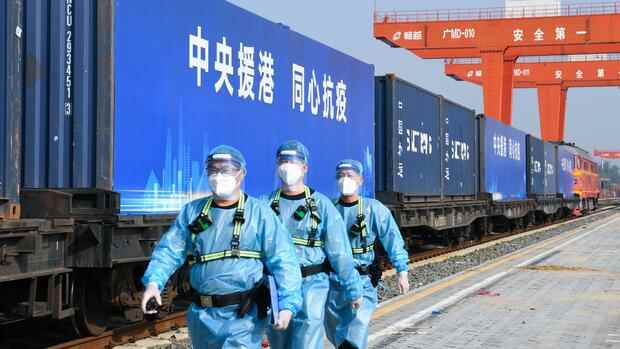Strict measures are now in place in the city due to the spread of the omicron variant of the corona virus.
(Photo: dpa)
Beijing China is currently experiencing the worst corona outbreak since the beginning of the pandemic: On Friday, the authorities registered more than 1,000 new infections within 24 hours for the first time, and on Sunday the number finally exceeded the 3,000 mark. In order to get the number of cases under control again, several cities enacted drastic measures – which are now also putting pressure on companies in the world’s second largest economy.
A curfew has been in effect for the 17 million inhabitants of Shenzhen since Monday until March 20th. The Apple supplier Foxconn therefore had to stop production at its manufacturing facility in the southern Chinese tech metropolis. The important port in the Shenzhen district of Yantian has not yet been affected by the lockdown, as the operator confirmed to Handelsblatt on request.
The authorities in Cangchun, northeast China, had already announced on Friday that the metropolis of millions was also going into a strict lockdown. The German car manufacturer Volkswagen also has a plant in the city with its Chinese partner FAW. When asked by the Handelsblatt, the Wolfsburg carmaker said that production there was initially stopped until Wednesday.
In a post on the Chinese social network Weibo, the well-known virologist Zhang Wenhong described the outbreak as “the most difficult phase” in two years.
Top jobs of the day
Find the best jobs now and
be notified by email.
The reports of the high number of infections and the strict restrictions also put pressure on the stock markets in Hong Kong and China on Monday. Both the Hang Seng Index and the Shanghai Stock Exchange fell.
Omicron leads to increase
With a zero-Covid strategy, Beijing had recently kept the infection process under control as far as possible: the government reacted to new infections with strict international travel restrictions, repeated mass tests and curfews. Only rarely did more than 100 people become infected per day in the country of 1.4 billion inhabitants during the course of the pandemic.
>> Read more: Incubation period and symptoms of the corona variant omicron
On Monday, the National Health Agency reported 2,125 new infections within one day – significantly more new cases than usual, but fewer than on Sunday. The fact that the virus is now spreading comparatively quickly is due to the omicron variant, which is considered highly contagious. The mutation first appeared in China in January.
Economists are already warning of the consequences for the economy if the restrictions are extended. In addition to direct effects on production in the economically important province of Guangdong, in which Shenzhen is located, the outbreak will also continue to weigh on consumption, according to experts.
China’s Premier Li Keqiang admitted at a press conference marking the conclusion of the annual National People’s Congress on Friday that consumer demand was “quite subdued”. Li promised more support for retail, tourism and cultural sectors.
However, the government wants to continue to adhere to the zero-Covid strategy. But Li promised that the authorities would work to make China’s response “more scientific and targeted” and maintain the normal functioning of daily life and supply chains.
More: Follow the current developments in the corona pandemic in the live blog
